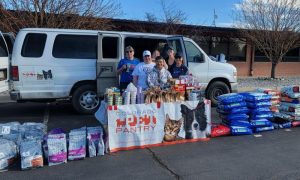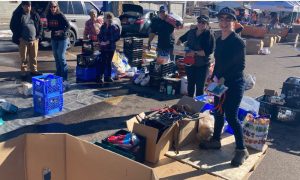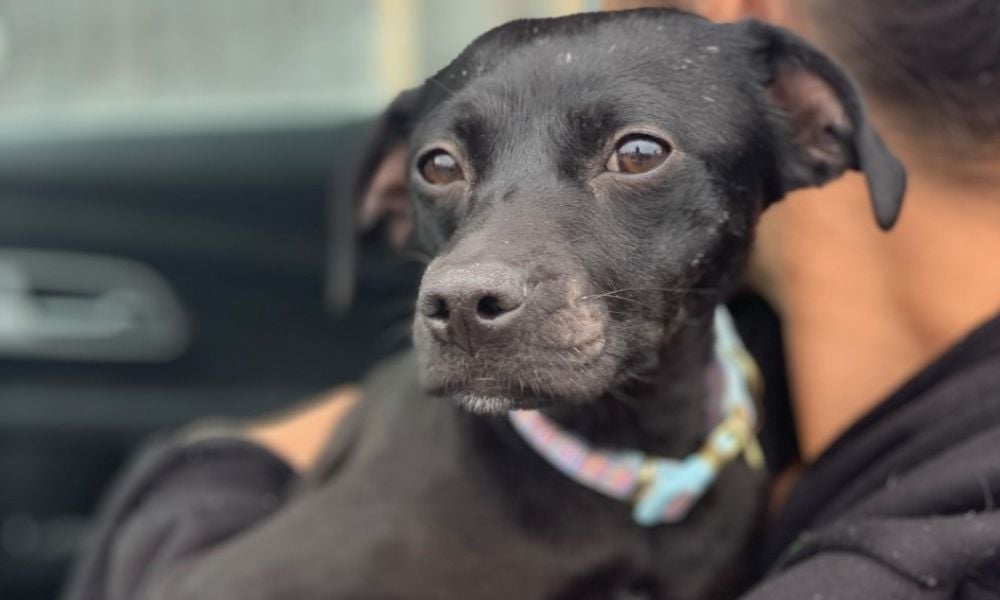Animal lover and dog guardian Eileen Lambert was driving one day in 2011 when a story about a pet pantry on the radio caught her ear.
She hadn’t heard of the concept and thought it was interesting, but she was caught up in a busy life working for a nonprofit, volunteering at an animal shelter, and caring for her family. She went about her business as usual.
But some part of her tucked away the idea. Then, through her volunteer work, she watched more and more struggling families surrendering companion animals they really seemed to love.
“I noticed they were relinquishing animals they didn’t really seem to want to give up,” Lambert told Lady Freethinker (LFT). “It broke my heart. So I started asking questions and seeking solutions.”
Lambert realized people said they couldn’t afford to keep their companion animals for three main reasons: housing costs, vet bills, or pet food and supplies. The last one seemed solvable to her.
“I knew I had supplies my animals didn’t use just lying around at home,” she said. “So I thought maybe other people did, too. I just wanted to collect all this stuff that people had and give it to people who needed it.”
For a year, Lambert talked to everyone who would listen to her about an idea for a pet food bank. She talked to human food banks. She talked to animal shelters and rescues. She went to a few trusted people in her life, whom she knew would call her idea crazy — if it were.
But no one called her crazy. Everyone thought it was a great idea. And everyone wanted to help.

Colorado Pet Pantry Clients (Courtesy of Colorado Pet Pantry)
In 2013, Lambert founded the Colorado Pet Pantry, a statewide nonprofit food bank that now helps distribute pet food, collars, toys, leashes, pet beds, and other needed supplies to more than 100 locations.
In March alone, the nonprofit served 9,583 pets from about 3,194 families and distributed more than 109,000 pounds and 18,000 cans of pet food — numbers they’ll likely repeat in the upcoming months, according to Colorado Pet Pantry.
The goal is to keep companion animals with their families, most of whom dearly love them but have hit rough patches in their lives: a lost job, an unexpected hospital visit or car accident, a natural disaster.
“The way I talk to people about this is I ask them, ‘In the past 15 years, have you experienced a time when you were living paycheck to paycheck?’” she said. “That resonates. We don’t want someone to relinquish their pet, when that pet is possibly the reason that person is alive and also that person’s best friend.”
One example from recent years is when dozens of people and pets were impacted by the Marshall fire, which tore through an urban area in Boulder, Colorado, and became the area’s most destructive fire in the state’s history.
“The most heart wrenching part of running this organization was the two weeks after that fire,” Lambert said. “It made me realize that this could have happened anywhere. It made me realize how tenuous our lives really are, and how close any of us can be to disaster.”
The need then, surprisingly, was for pet beds, Lambert said.
“Of course people weren’t grabbing their pet beds,” she said. “They were grabbing their pets and getting out.”

(Courtesy of Colorado Pet Pantry)
When Lambert put out a call for pet beds on social media, she was shocked — and amazed — to come home one day to find her entire driveway lined with Amazon boxes from the nonprofit’s wish list. It has been heartwarming moments like those that keep her going — especially now when demand for the pantry’s services is so high.
With many people now reeling from inflation, increased housing costs, and an end to several COVID-19 measures meant to ease financial burdens — including eviction moratoriums and a hard end to increased federal assistance through the Supplemental Nutrition Assistance Program (SNAP) — the Colorado Pet Pantry is seeing a record amount of need, Lambert said.
One duo the nonprofit helped was a 15-year-old cat named Kupka and a woman named Tori, who was living off Social Security benefits and on a tight budget.
“We are grateful that Colorado pet pantry is able to help us through the generosity of their supporters,” Tori said in a post on the nonprofit’s website.

Kupka (Courtesy of Colorado Pet Pantry)
Clients can pick up pet food and supplies every other month at one of the distribution centers. Of the more than 100 monthly pet food banks, 30 are open to the public — meaning people can walk up and get what they need. Partnerships with existing charities, like veterans’ groups or Meals on Wheels, make up the remainder, through which the partners hand out pet food along with human food or supplies.
The nonprofit’s goal is to supply up to 50 percent of a pet’s needs so that people are empowered to keep their companion animals, while also still making their own plans to meet their needs.
“It’s the same at a human food bank, where the goal is to supplement,” Lambert explained. “This helps people keep thinking about how to keep pet food in their budget and that they still have to take care of their pet. It also helps us serve more people.”
Eventually, clients fall off the food pantry’s rolls. After they find a new job or overcome their struggles, some become donors or even volunteers, Lambert added.
Organizers also run an emergency pet food assistance program, through which people who don’t have enough pet food to make it to the next distribution date can, once per year, request additional supplies. Through its Animal Welfare Share Program, the nonprofit also allows local animal shelters to “shop” — for free — for needed supplies like collars or leashes at its warehouse in Denver.
Thanks to existing partnerships, a donation of $5 is enough to feed one pet for a month, Lambert said. Those wanting to support Colorado Pet Pantry also can donate their time, needed supplies (including dry and canned pet food, litter, toys, leashes, collars, and other accessories), stock, their cars, or participate in a corporate matching program!

(Courtesy of Colorado Pet Pantry)
All these years later, Lambert still describes the pantry’s work as a “win-win-win.”
“It’s better for the person, it’s better for the pet, and it’s better for the animal shelters,” she said. “I know we are making a huge difference, because animal shelters give out our number all the time, and we hear from people all the time that they couldn’t keep their animals if not for us, how this allows them to pay their rent and utilities, take care of their families, and keep their pets.”
To learn more about Colorado Pet Pantry or support their efforts, you can visit their website here or follow them on social media.







